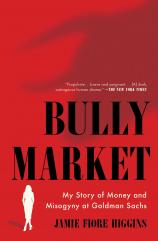Bully Market: My Story of Money and Misogyny at Goldman Sachs
Review
Bully Market: My Story of Money and Misogyny at Goldman Sachs
Unlike most of her peers at Goldman Sachs’s Global Training Program, Jamie Fiore Higgins did not spend her whole college career scheming how to get an elusive job at the world-famous investment bank and financial services company.
As recently as her junior year at Bryn Mawr, Jamie considered following the advice given by a career aptitude test and pursue a career in social work. But the shocked reaction of her parents led Jamie to make different choices. Her parents, the children of immigrants, had worked their whole lives to save enough money to send her to the best schools. They had put themselves at considerable financial risk to pay for life-saving surgery for Jamie, who had severe scoliosis as a child.
"One hopes that readers not only will be stunned and saddened by Jamie Fiore Higgins’ individual experience, but will be spurred to action, to examine their own professional situations with clear eyes and a commitment to improve practices in their own industries."
Settling for a career in social work was not the best way to reward those years of sacrifice. So instead, Jamie aimed high, applying for a position at Goldman Sachs and undergoing the many rounds of interviews that made Goldman, according to her coworkers, harder to get into than Harvard. From day one, she feels out of her element at Goldman; she doesn’t have the “right” clothes or shoes, and she barely understands the financial terms that she’s soon to get grilled on.
But Jamie is a fast learner, and her math degree from Bryn Mawr means that she’s well-equipped to become a high-performing analyst in her department, plugging away at small accounts that might go unnoticed by her peers but have a big impact in the aggregate. And when Jamie brings home her first year-end bonus (spoiler alert: it’s far more than what the average American earns in a year), the look on her parents’ faces (and the comfortable amount in her savings account) is worth all of the hassles and discomfort she feels on the job.
Jamie sticks it out at Goldman for more than 15 years, eventually one of only a handful of women to be named managing director. But, as she spells out in this gripping memoir, that title --- and the salary and bonuses that accompany it --- came at a significant cost. Jamie underwent countless instances of bullying by others in her department who viewed her as a threat and sought to undermine her success. She was sexually assaulted on the job and ruthlessly mocked when, for example, she decided to take advantage of Goldman’s pumping facilities for working moms. She also experienced the daily heartbreak of barely getting to see her three young children, and the stress of trying to keep her marriage together under immense professional pressure.
But perhaps the most challenging parts of Higgins’ story to read are those in which she admits to her own failures to try to make Goldman a more supportive and inclusive environment for others. Throughout her career, Jamie was consistently and repeatedly let down by the very people --- human resources professionals, lawyers, even her closest work friends --- she thought she could trust, and she feels most like a failure when she finds herself unable to effectively mentor or serve as a role model for others.
It might be easy to dismiss BULLY MARKET as an account of one woman’s harrowing experience at a very particular kind of workplace at a very particular time. However, as Jamie expresses more clearly near the end of her memoir, and especially in the afterword, many of the factors that contributed to her awful experience are present in all kinds of industries, not just in the financial sector or in large firms. She points out places in which employers often have vast distance between the kinds of values they publicly hold and how they treat their employees in private. She calls out companies for paying lip service to things like diversity in hiring but then utterly fail to support employees from marginalized groups once they actually get their feet in the door.
One hopes that readers not only will be stunned and saddened by Jamie Fiore Higgins’ individual experience, but will be spurred to action, to examine their own professional situations with clear eyes and a commitment to improve practices in their own industries.
Reviewed by Norah Piehl on September 9, 2022
Bully Market: My Story of Money and Misogyny at Goldman Sachs
- Publication Date: May 2, 2023
- Genres: Business, Economics, Memoir, Nonfiction, Sociology
- Paperback: 336 pages
- Publisher: Simon & Schuster
- ISBN-10: 1668001039
- ISBN-13: 9781668001035




